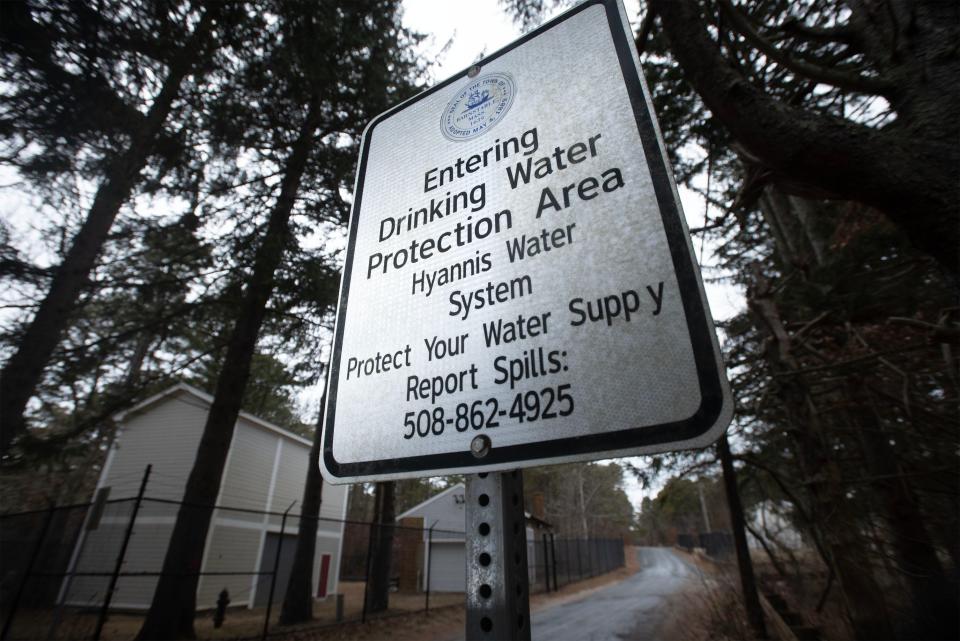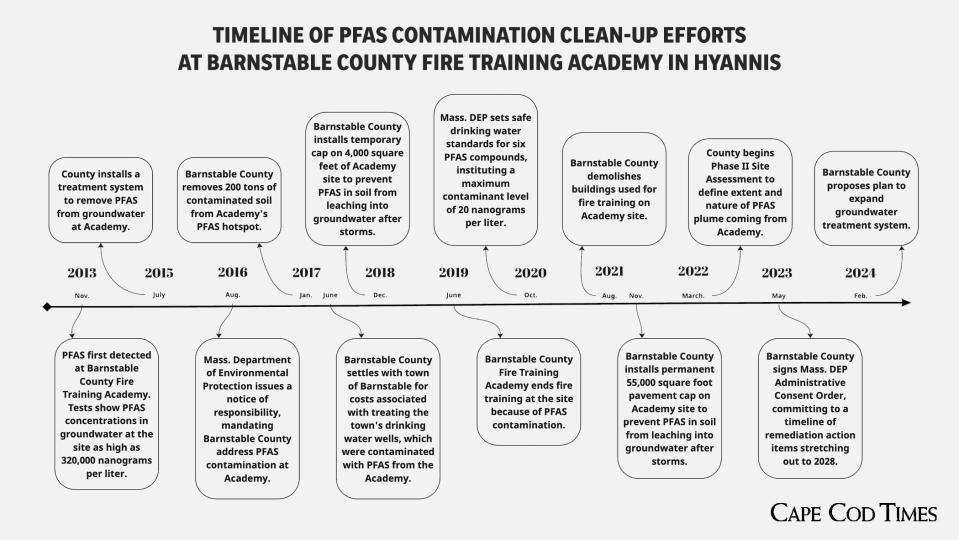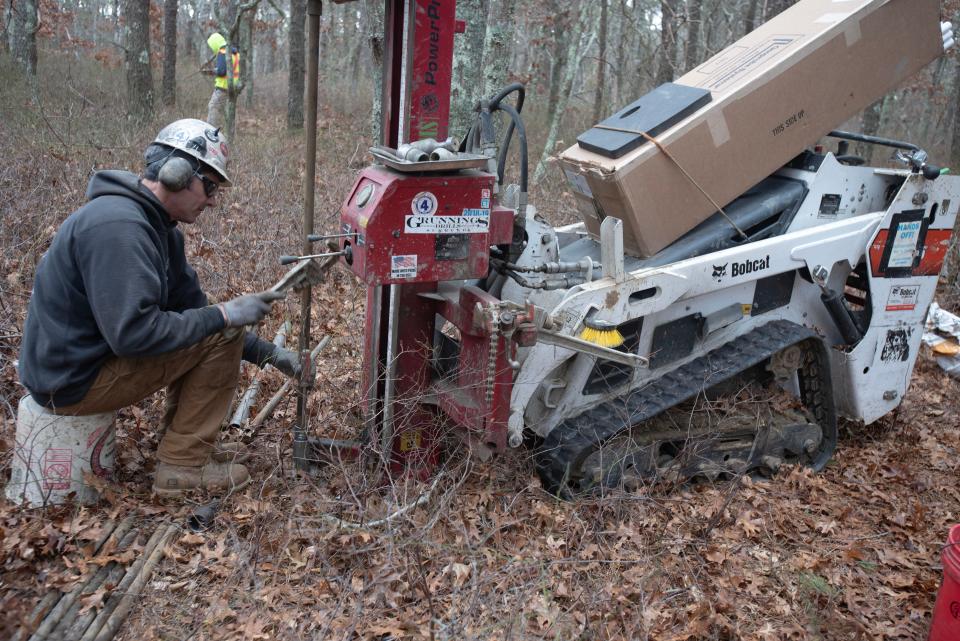PFAS hotspot in Hyannis is 225 times the state standard. What's being done?
Sometime in the late 1950s or early 1960s, firefighters from departments across Cape Cod started using a firefighting foam laden with PFAS as they trained at the county-owned fire academy in Hyannis.
For much of that time, the dangers of PFAS, or per- and polyfluoroalkyl substances, were unknown to firefighters spraying the foam, made to extinguish especially intense fires.
PFAS — manmade chemicals designed to be non-stick, waterproof, and stain and flame-resistant — have since been linked to health problems, including cancers, immunotoxicity in children, thyroid disease, and reproductive problems. They’re often called “forever chemicals” because they accumulate over time in people, animals and the environment — and don’t break down easily.

Over roughly five decades, the foam soaked into the ground at the academy as well as at the nearby Cape Cod Gateway Airport, which also used the foam for years to extinguish fires.
Then, the contamination spread.
In 2010, just as governments were starting to regulate PFAS, researchers probing Cape cancer rates published a study showing the chemicals had contaminated Hyannis drinking water wells. The town began testing Hyannis wells for PFAS in 2013 under Environmental Protection Agency rules. In 2016, the town began carbon filtration treatment at the wells.
As a result, the water that comes out of Hyannis taps meets safe drinking water standards set by the state in 2020.
But treatment at drinking water wellheads won't stop the area’s PFAS from spreading further into Hyannis through the region's sole-source aquifer, which is essentially an underground glacial sandpile that holds groundwater, local officials and hydrogeologists said. The aquifer provides 100% of the Cape's drinking water.
That’s why Barnstable County, under a state mandate to clean up the contamination, wants to expand the fire academy’s existing groundwater pump-and-treat system.
The goal is to “control the plume coming off of our site,” Barnstable County Assets and Infrastructure Manager Paul Ruszala said at a late January public meeting.
System design begins this spring, and construction is expected to start in 2025.
PFAS hotspot by Hyannis fire academy is 225 times the state standard
Tests revealed sky-high levels of PFAS in groundwater near the fire training academy, where firefighters sprayed firefighting foam as late as 2015.
That year, PFW-2, a monitoring well at the fire academy’s so-called “hotspot” — where the highest concentrations of PFAS were found — showed groundwater concentrations of roughly 225,000 nanograms per liter for a group of six PFAS chemicals, known collectively as PFAS6, according to a September 2023 report by BETA Group, the company now managing the fire academy cleanup for the county.
The state standard for PFAS in groundwater, instituted in 2019, is 20 nanograms per liter.
PFAS concentrations in the aquifer below the academy plummeted after the county paid for cleanup work, which included installing the existing groundwater treatment system, removing 200 tons of contaminated soil and installing a pavement cap to prevent precipitation from washing more PFAS into groundwater.

In July 2023, tests from that same hotspot monitoring well showed PFAS6 concentrations around 4,500 nanograms per liter, according to BETA Group’s Roger Thibault, the county’s licensed site professional.
Though dramatically lower than the staggering numbers recorded in 2015, recent PFAS6 concentrations at the monitoring well have crept up over the past few years from lows in 2020. Thibault said the county is investigating reasons for the uptick.
PFAS cleanup has been effective, but the site’s current groundwater treatment system, installed in 2015, isn’t pumping enough contamination from the plume emanating from the academy to stop the chemicals’ underground spread south and southeast into Hyannis, officials said.
Expanding the groundwater treatment system will involve drilling more wells around the fire academy’s PFAS plume. Those wells will be outfitted with pumps that suck up PFAS-tainted groundwater from beneath the soil. The pumps connect to treatment systems that filter PFAS compounds from the groundwater. Once the water is treated, it is strategically put back into the surrounding environment.
Cleaning contaminated groundwater from the most polluted area means fewer chemicals will travel underground from the site through the aquifer, officials said.
The full extent of the fire academy PFAS plume is not yet mapped.
Under state environmental regulations, the county is required to map the PFAS plume emanating from the fire academy, the outer boundaries of which are still unknown.
The known area of the plume continues to grow as the county drills and tests monitoring wells farther away from the academy, according to results reported at a recent public meeting.
Residents have urged the county, which has run into delays accessing and drilling monitoring wells on off-county property over the past year, to speed up its mapping work.
In the fall, DEP officials convened a private meeting about PFAS contamination in Hyannis to "discuss increased collaboration" among those working on the problem for the county, town and nearby Cape Cod Gateway Airport, which is responsible for managing its own PFAS plume, said Fabienne Alexis, DEP deputy press secretary.

“Intergovernmental coordination meetings are standard and routine,” Alexis said of the meeting, which was closed to the public. "This meeting was a good opportunity for the teams to compare lessons learned in their assessments and to outline their individual paths forward over the coming year and look for any opportunities to align work.”
County officials say progress is happening. This month, workers drilled new monitoring wells on state Fish and Wildlife land east of Mary Dunn Pond that will shed more light on the chemicals’ underground route.
State regulations also require the county to determine the impact of the pollution on human and ecological health, as well as public welfare and safety, according to Marie Rudimen, a toxicologist and risk assessor working on fire academy cleanup for the county. A federally-funded health study of Hyannis residents exposed to PFAS through drinking water before treatment began is also ongoing.
The county's full assessment of the nature and extent of the PFAS plume is expected to wrap up sometime in 2025.
How does PFAS affect drinking water in Hyannis?
The expanded groundwater treatment system is intended to help contain the problem, but it’s not a solution to the area’s PFAS woes, which are compounded by an abutting PFAS plume from the Cape Cod Gateway Airport.
Both plumes are near Hyannis drinking water wells.
Tests show Hyannis drinking water is safe according to standards set by the state, which imposed safe drinking water limits for PFAS6 chemicals in 2020, which are different from groundwater standards. No federal standard exists, but last year the Environmental Protection Agency proposed instituting stricter nationwide PFAS drinking water limits than those on the books in Massachusetts.
“All of our wells are outfitted with state-of-the-art treatment systems for PFAS and there is no detectable PFAS in the Hyannis Water System, which is operated by the Department of Public Works and serves the villages of Hyannis, Hyannisport and West Hyannisport,” Barnstable DPW Director Daniel Santos said in a statement.
Before carbon treatment, the average concentration of PFAS6 in Hyannis drinking water wells was roughly 210 nanograms per liter, according to a 2021 report authored by Tom Cambareri, a water resources specialist and hydrologist with more than a decade of experience working on PFAS contamination in Hyannis, formerly for the county and town.
After carbon treatment, those concentrations essentially fall to zero, according to Santos.
Removing PFAS from drinking water is expensive.
In fiscal year 2023, the annual cost of treating Hyannis water for PFAS was just over $2 million, according to Hans Keijser, Hyannis’s water supply division supervisor.
By taking more PFAS out of groundwater near the fire academy, the county’s expanded pump and treat system should help reduce those costs, Santos said. Any savings would benefit the town and county, which pays part of the cost of treating Hyannis drinking water for PFAS because of a 2017 settlement.
“If they were removing more PFAS before the treatment system, there'd be less PFAS coming into our wells,” Santos said. “We would have to regenerate or replace the carbon less frequently, which would save money.”
Until the new system is operational, it is difficult to know how much those savings will total, Santos said.
How will Barnstable County pay for expanded groundwater treatment system?
The current groundwater treatment system at the fire academy costs roughly $700,000 annually to operate, according to the county. Cost estimates for annual operation of the expanded treatment system will be available after it is designed, said County Administrator Elizabeth Albert.
Barnstable County’s Board of Regional Commissioners recently voted to set aside $7.2 million for the expanded groundwater treatment system, some of which would be spent on operations if approved by the Barnstable County Assembly of Delegates.
Assembly Speaker Patrick Princi said the county’s legislative body is “100% committed to funding the County’s clean-up of PFAS contamination.”
The county anticipates using $4 million in federal American Rescue Plan Act money to pay for design and construction of the expanded groundwater treatment system, Albert said.
To fund the remainder of the $15 million project, the county plans to apply for a zero-interest state loan that includes some forgiveness.
Full cost of cleaning Barnstable's PFAS contamination, situated in the heart of Cape Cod, will be astronomical.
The age and size of the fire academy’s PFAS contamination, the heavily wooded surroundings, proximity to other PFAS releases, issues surrounding property ownership and access, and the challenging nature of the area’s hydrology — influenced by ponds and public drinking water wells — make it a complex cleanup site, state and local officials said.
The county projects the work needed to map the outer boundaries of the fire training academy PFAS plume, assess its impacts and then build a cleanup program, will cost between $20 million and $60 million. Those figures could climb as more data becomes available and PFAS treatment technology advances, county officials said.
For context, the county’s annual budget for fiscal year 2024 totaled roughly $23.1 million.
“This funding question for Barnstable County is critically important,” Albert said, adding that county staff are seeking state and federal money as well as exploring whether other parties should share in the long-term cleanup cost.
Among those efforts is a slow-moving lawsuit against the manufacturers of the firefighting foam that contaminated the land, including 3M and DuPont, filed by the county in 2017.
Residents are also asking for financial help to deal with the consequences of Hyannis's PFAS plumes.
Members of the Greater Hyannis Civic Association are now waiting to hear whether their application for a state technical assistance grant — which provides community groups funding to hire experts who can help navigate clean-ups like those going on in Hyannis — will get the green light from DEP. Grants will be awarded in coming weeks, according to the agency.
Jeannette Hinkle is a Cape Cod Times reporter. Reach her at jhinkle@capecodonline.com.
Thanks to our subscribers, who help make this coverage possible. If you are not a subscriber, please consider supporting quality local journalism with a Cape Cod Times subscription. Here are our subscription plans.
This article originally appeared on Cape Cod Times: Barnstable County PFAS: Update on cleanup at Hyannis fire academy

